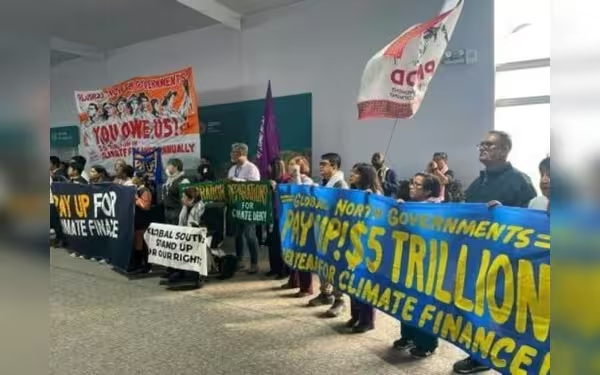Sunday, December 22, 2024 04:15 AM
Urgent Call for Climate Justice at UN Talks
- Developing nations demand $300 billion for climate aid.
- Small island nations express frustration over climate negotiations.
- Climate justice emphasizes support for the most vulnerable countries.
 Image Credits: tribune.com.pk
Image Credits: tribune.com.pkKey nations face pressure to provide $300 billion in climate aid as vulnerable countries demand urgent support at UN climate talks.
The ongoing UN climate talks have reached a critical juncture as key nations scramble to address the urgent demands of the world’s poorest countries. These nations, which are often the most vulnerable to the impacts of climate change, are calling for substantial financial assistance—specifically, more than $300 billion annually from historically wealthy nations that have contributed significantly to global emissions. This situation highlights the growing tension between developed and developing countries as they navigate the complexities of climate responsibility and financial support.
On Saturday, representatives from small island nations, which face existential threats from rising sea levels, alongside impoverished African states, expressed their frustration during a meeting with Azerbaijan. Their anger boiled over when they felt their concerns were dismissed, leading to a dramatic walkout. This incident underscores the urgency of the situation, as these nations are not just negotiating for funds; they are fighting for their very survival in the face of climate change.
The demands for financial aid are rooted in the principle of climate justice, which argues that those who have contributed the least to climate change should not bear the brunt of its effects. The poorest countries, often lacking the resources to adapt to climate impacts, are calling for a fair share of the financial pie to help them build resilience and mitigate the effects of climate change. The $300 billion figure is not arbitrary; it reflects the estimated costs of adaptation and mitigation efforts needed to protect vulnerable communities.
As the talks continue, it is crucial for wealthier nations to recognize their historical role in contributing to climate change and to take meaningful steps towards supporting those in need. The stakes are high, and the world is watching. The outcome of these negotiations could set a precedent for international cooperation on climate issues, or it could lead to further divisions and discontent among nations.
The push to salvage the UN climate talks is not just about numbers and agreements; it is about the future of millions of people who are already feeling the harsh impacts of climate change. As discussions unfold, it is imperative for all parties involved to listen, engage, and work towards a solution that prioritizes the needs of the most vulnerable. Only through collaboration and understanding can we hope to address the climate crisis effectively and equitably.













